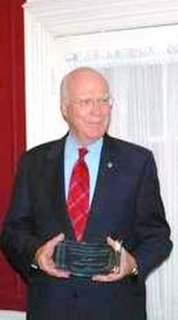
This week the gentleman from Vermont rose in the Senate chamber to speak on Nepal's downward spiral for the third time in six months. His 1,012-word diatribe was focused on familiar targets: the military and the monarch that heads it.
But there was a difference. Leahy sounded impressed at the headway his effort to drive a wedge between the palace and Army HQ has made in recent months. India, Girija Prasad Koirala and Madhav Kumar Nepal have all picked up that theme, although it's becoming harder to make distinctions among the three these days.
Actually, Maoist thinker-in-chief Dr. Baburam Bhattarai introduced that debate publicly in his famed opinion piece in Kantipur after the Narayanhity massacre. He probably wouldn't mind Sen. Leahy taking credit if it helps to produce the desired effect.
In a speech to the Senate on December 21, Leahy sought to build on his platform of persuading the army to choose between the crown and the country. The following excerpt is revealing:
"Only the army has the ability to convince the King to abandon his imperial ambitions, but time is running out. The army’s chief of staff, General Pyar Jung Thapa, was privileged to receive training at the Army War College and he has participated in other U.S. military training programs. He has led Nepali troops in UN peacekeeping missions.
"He knows, or he should have learned, that the function of a modern, professional military is to protect the rights and security of the people, not the privileges of a dictator who has squandered the moral authority of his office. It is not only in the interests of Nepal, but in the army’s long term self interest, to show real leadership at this critical time.
"The United States should do everything possible to encourage the army to announce its own ceasefire, to accept international observers as the Maoists have said they would do, and to support a broadly inclusive political dialogue with or without the participation of the palace."
Maila Baje can't help wondering what drives Sen. Leahy's concern. Peace and democracy? If that consideration alone were the factor, it should have inspired a unanimous Senate resolution.
Personality? Sen. Leahy, after all, was first elected to the Senate in 1974 the same year he was named one of three outstanding prosecutors in the United States. Experience on the Hill must have compensated much more than age could have taken away from that fighting zeal. (Vice-President Dick Cheney, president of the Senate, dislikes half the chamber. But he, too, could reserve the F word only for Sen. Leahy.)
Temperament alone cannot explain why the seventh most senior Senator – and the ranking Democrat on the Judiciary Committee – feels so much for Nepal. Maybe there's something in his congressional record.
One of the most prominent U.S. officeholders in the international campaign against the production, export and use of anti-personnel landmines, Sen. Leahy couldn't have missed how Nepal bucked the international trend and registered an increase in killings linked to those weapons.
One of the first members of Congress to go online – and the second senator to post a homepage – Sen. Leahy must have been stunned by the way King Gyanendra could disconnect Nepal from the outside world for days in this heavily wired (and wireless) world.
One of only two politicians ever awarded the John Peter Zenger Press Freedom Award, Sen. Leahy's temper must have gone through the roof when King Gyanendra's government introduced that maligned media ordinance.
Ranked among the top environmental legislators by the nation's foremost conservation organizations, the senator probably has a deep-seated grudge against the monarch. If King Gyanendra is so resolute about his objectives – something the monarch's fiercest critics acknowledge in private – how could Nepal get its worst environmental record when he, as prince, headed the King Mahendra Trust for Nature Conservation?
Then things started falling into place: Tibet. The Congressional Record shows that Sen. Leahy's record on Tibet is second only to Dianne Feinstein's. You're likely to find Leahy's name far ahead of Joe Lieberman, Carl Levin, Barbara Boxer, Russ Feingold and even Edward Kennedy when it comes to matters concerning the arid plateau north of Nepal.
Maybe King Gyanendra is merely the lateral route through which Sen. Leahy seeks to bludgeon China. If the monarch hadn't shut down the Dalai Lama's offices in Kathmandu before appointing himself prime minister, would Sen. Leahy be singing paeans to royal resoluteness? Nah – unless the royal regime faced a full-scale Chinese embargo.